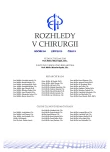-
Medical journals
- Career
Choledochal cyst
Authors: J. Zeithaml 1; V. Třeška 1; J. Moláček 1; F. Heidenreich 2
Authors‘ workplace: Chirurgická klinika FN a LF UK v Plzni přednosta: prof. MUDr. V. Třeška, DrSc. 1; Klinika zobrazovacích metod FN a LF UK v Plzni přednosta: prof. MUDr. B. Kreuzberg, CSc. 2
Published in: Rozhl. Chir., 2015, roč. 94, č. 9, s. 379-382.
Category: Case Reports
Overview
Choledochal cyst is a rare disease with a considerably higher incidence found in the Asian population. Although its etiology is not completely known, the disease is believed to be associated with anomalies in the anatomy of the biliary tract. While being a benign unit, it is considered as a precancerosis with the risk of conversion to the biliary tract carcinoma. Radical surgical removal with biliary tract reconstruction is the only curative solution. The authors present the case report of a patient with choledochal cyst type I according to Todani
Key words:
choledochal cyst − classification – diagnosis − treatment
Sources
1. Gotohda N, Itano S, Horiki S, et al. Gallbladder agenesis with no other biliary tract abnormality: report of a case and review of the literature. J Hepatobiliary Pancreat Surg 2000;7 : 327−30.
2. Lee HK, Park SJ, Yi BH, et al. Imaging features of adult choledochal cysts: a pictorial review. Korean J Radiol. 2009;10 : 71–80.
3. Rozel C, Garel L, Rypens F, et al. Imaging of biliary disorders in children. Pediatr Radiol 2011;41 : 208–20.
4. Huang CS, Huang CC, Chen DF. Choledochal cysts: differences between pediatric and adult patients. J Gastrointest Surg 2010;14 : 1105–10.
5. Shah OJ, Shera AH, Zargar SA, et al. Choledochal cysts in children and adults with contrasting profiles: 11-year experience at a tertiary care center in Kashmir. World J Surg 2009;33 : 2403–11.
6. Murphy AJ, Axt JR, Lovvorn HN, 3rd. Associations between pediatric choledochal cysts, biliary atresia, and congenital cardiac anomalies. J Surg Res 2012;177:e59–63.
7. Ohashi T, Wakai T, Kubota M, et al. Risk of subsequent biliary malignancy in patients undergoing cyst excision for congenital choledochal cysts. J Gastroenterol Hepatol 2013;28 : 243–7.
8. Jan YY, Chen HM, Chen MF. Malignancy in choledochal cysts. Hepatogastroenterology 2002;49 : 100–3.
9. Paris C, Bejjani J, Beaunoyer M, et al. Endoscopic retrograde cholangiopancreatography is useful and safe in children. J Pediatr Surg 2010;45 : 938−42.
10. de Vries JS, de Vries S, Aronson DC, et al. Choledochal cysts: age of presentation, symptoms, and late complications related to Todani‘s classification. J Pediatr Surg 2002;37 : 1568–73.
11. Narayanan SK, Chen Y, Narasimhan KL, et al. Hepaticoduodenostomy versus hepaticojejunostomy after resection of choledochal cyst: A systematic review and meta-analysis. J Pediatr Surg 2013;48 : 2336–42.
12. Ňaršanská A, Třeška V, Mírka H, et al. Caroliho nemoc – dilatace intrahepatálních žlučových cest. Rozhl Chir 2011;90 : 281−4.
13. Lee SE, Jang JY, Lee YJ, et al. Choledochal cyst and associated malignant tumors in adults: a multicenter survey in South Korea. Arch Surg 2011;146 : 1178–84.
Labels
Surgery Orthopaedics Trauma surgery
Article was published inPerspectives in Surgery

2015 Issue 9-
All articles in this issue
- Gastric stump cancer – unicentric analysis of 7 patients
- Cholecystostomy – an obsolete or relevant treatment?
- The use of hybrid revascularization procedures for the therapy of multilevel lower extremity arterial disease – analysis of single center experience
- Choledochal cyst
- Extraintestinal GIST – case report
- Surgical options to treat constipation: A brief overview
- Perspectives in Surgery
- Journal archive
- Current issue
- Online only
- About the journal
Most read in this issue- Surgical options to treat constipation: A brief overview
- Cholecystostomy – an obsolete or relevant treatment?
- Choledochal cyst
- Extraintestinal GIST – case report
Login#ADS_BOTTOM_SCRIPTS#Forgotten passwordEnter the email address that you registered with. We will send you instructions on how to set a new password.
- Career

